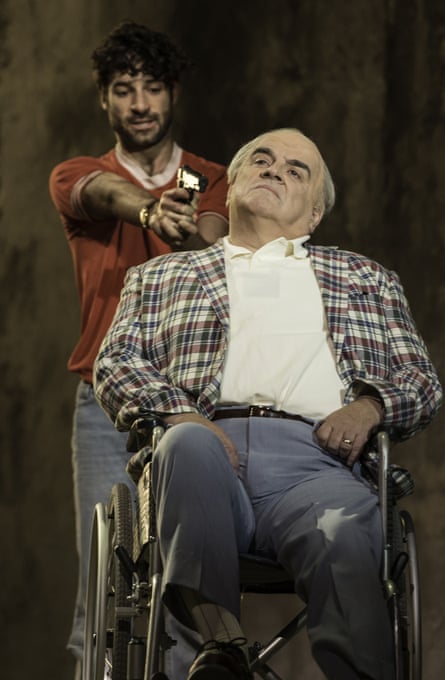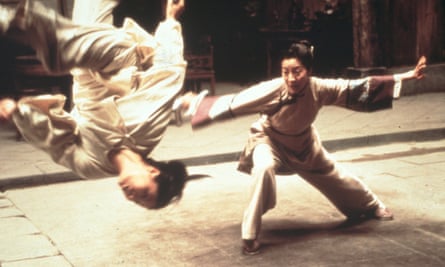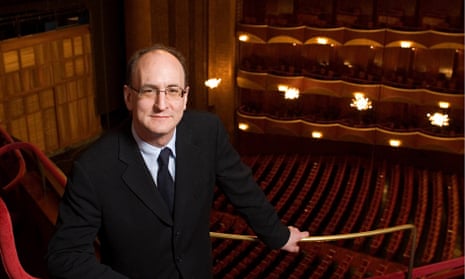Opera is not many people’s idea of a good business model,” laughs Peter Gelb, general manager of New York’s Metropolitan Opera. The statement is such a truism, he says, that he was recently invited by Stanford University to speak about the industry to its postgraduate economics students. “Aside from the costs, complexities and risks of putting it on, they wanted to know how an ageing industry, with a loyal but also ageing customer base, attempts to keep that customer base while simultaneously trying to appeal to a new audience. It is an interesting question, and one not dissimilar to that faced by news organisations at the moment.”
The Met is the largest and most powerful opera house in the world and Gelb is routinely referred to as the most powerful person in the industry. But for all that, such have been the economic challenges facing the Met that he has found himself over the last few years embroiled in disputes with opera unions over cost-cutting that threatened to close the house down. And money is only one factor. The culture wars loom large for an art form increasingly dismissed as marginal, and last season Gelb had to contend with death threats as well as accusations of antisemitism and censorship arising from the Met’s production of John Adam’s opera The Death of Klinghoffer, as well as gay rights and pro-Ukrainian demonstrators objecting to Russian conductor Valery Gergiev and star soprano Anna Netrebko’s apparent closeness to Vladimir Putin. Last week’s opening of the 2015/16 season, Gelb’s 10th in charge, with a new production of Otello, was relatively low-key by these standards, but was still preceded by vehement public discussion as to whether the Latvian tenor Aleksandrs Antonenko should wear blackface to sing “the Moor”. (He didn’t.)
All of this comes in addition to the core dilemma of “having one older audience that thinks I’m too progressive alongside critics who think I’m too conservative. But the very fact I am still here means I have been able to walk that tightrope, and overall people seem to really enjoy the shows and ultimately we want the work to be seen by as many people as possible.” In this aim Gelb is certainly succeeding. Last season 3.2 million people paid to watch performances, 2.6 million of them via their Live in HD simulcasts to 2,000 cinemas in 70 countries around the world.
The 2015 HD season opens on 3 October with Il Trovatore starring Dmitri Hvorostovsky and Netrebko, the first of 10 productions to be broadcast. “We don’t just offer the chestnuts,” explains Gelb. “We try to offer a survey of the whole season with works such as Berg’s Lulu as well as Manon Lescaut, to allow the movie audience to see operas that they may not have seen before.”
The HD programme was inaugurated in Gelb’s first season as part of his aim to “shake things up”. The idea came after Beverly Sills, then chair of the Met, showed him a 1950s photograph of a group of people sitting round a radio in a school gymnasium in a small mid-western town listening to the famous live Saturday matinee radio broadcasts from the Met.
“The technology was becoming available to make live HD broadcasts a natural extension of the live radio,” he says. “The initial business plan was to try and gain the benefits of promotion and accessibility while breaking even from ticket sales to an audience already accustomed to listening to the radio.” By the end of the second year they were indeed breaking even and within three years were making money on the HD shows alone. “We created the model that other companies now follow, the National Theatre in London being a prime example.” The broadcasts, which attract an average audience of around 250,000 people, contribute nearly $20m to an overall budget of just under $300m. “They have had a great influence on attracting new audiences to the Met when people visit New York from abroad, and in smaller cities and towns it gives people the chance to see the biggest stars. It is strange to say, but even in Germany, which is the largest market outside the US, the Met has effectively become some people’s local opera company.”

For Gelb the Met has always been his local opera company. Born in New York in 1953, his mother was a niece of the violinist Jascha Heifetz and his father was a managing editor of the New York Times and oversaw the paper’s cultural coverage. While Gelb never attended the old Met on 39th street, he was with his parents in then general manager Rudolf Bing’s box for a performance of Carmen during the opening season of the new house at Lincoln Center in 1967. “Bing got angry with some audience members who were booing and went over to their box to yell at them,” he recalls, “which I thought was very impressive.”
By the age of 16 Gelb was occasionally working as an usher at the house and after leaving school he joined the office of a high-profile New York music impresario where he was exposed to an entrepreneurial model of business that has stayed with him ever since. He won a place at Yale, but quit after just a few weeks to begin a career in music management. He went on to manage the Boston Symphony Orchestra for their groundbreaking 1979 tour of China, as well as the great pianist Vladimir Horowitz at the end of his career, which included his emotional and politically sensitive return to Russia in 1986 after 40 years in exile. Working for Columbia management, Gelb then executive-produced the Met’s TV productions which won him six prime-time Emmys. Immediately prior to his appointment to the Met he was president of Sony Classical at a time when “the record industry was sinking. I was attacked by critics for attempting to be commercial, but we were a for-profit company. I’ve always viewed myself as a marriage broker in the arts, bringing different creative people together, and we went to Hollywood to make soundtracks.” Sony Classical won the soundtrack Academy award four years in a row for films including Crouching Tiger, Hidden Dragon and The Red Violin. “I made musical suggestions to directors that I thought would help them in their storytelling.” He brought together composer Tan Dun with director Ang Lee, “and I also introduced Yo-Yo Ma into the mix. When I came to the Met I continued to do that with directors who had never worked there before, such as François Girard, who made The Red Violin and directed an acclaimed production of Parsifal for us.”

Gelb’s perceived commercialism made him a controversial choice to run the Met. He has ensured that he has an artistic free rein, something not always granted to his predecessors. “There was a time when it wasn’t necessarily the general manager who would decide which operas were put on. Historically the board have not been hands-off and there have been moments of tension.” But on the financial side he reports to them. “For any business decisions I need their approval and so when it was decided to adopt a tough negotiating position with the union, which was my idea made out of necessity, the board stood strongly behind it.”
He describes the union dispute as “a game of chicken with neither of us wanting a work stoppage but not wanting to budge. Of course we both did budge, and the compromise resulted in a significant wage cut but also other cuts across the board, and we shaved off more than $22m in expenses. But looking back at the season, I can say we did it without any real artistic compromise.”
He declares the short-term financial footing as “sounder. I’m not sure opera is ever sound”, and last week the company reported a budget surplus of $1m, the first for several years. But he warns that there will have to be other changes and says he is looking at new schedules – especially Sunday performances – as well as possibly offering naming rights of the building to sponsors.
The bruising experience of the labour negotiations were played out alongside objections to The Death of Klinghoffer, Adams’s 1991 opera based on the 1985 murder of a wheelchair-using Israeli tourist by Palestinian terrorists on the Achille Lauro cruise ship. Gelb was always “very vocal” that while there is indeed rising antisemitism around the world, the opera was not antisemitic. But some Jewish groups objected to the subject matter and as opinions became more heated, divisive and threatening, Gelb, who describes himself as a “cultural Jew with a strong sense of Jewish heritage without being particularly religious and certainly not anti-Israel”, cancelled the HD broadcasts, arguing that he couldn’t control the experience in 2,000 cinemas round the world. “It became very difficult. Long-standing donors disagreed as to what should be done. But the reasons why it was attacked are invalid. Just because the terrorists say antisemitic things doesn’t make the work antisemitic. In Schindler’s List the Nazis are Nazis. The end of the opera is incredibly powerful. The reason Klinghoffer is murdered is because he stands up, literally from his wheelchair, and calls the terrorists out. Then his wife gives this incredibly moving aria about heroism, but also about a more complex situation. Artistically we were vindicated. It is a great piece.”
Gelb was dismayed that on the opening night “the place was crawling with police, dogs, plainclothes. There were a few shouts and I had a police escort for a few weeks”, but he says he wouldn’t have done anything differently. “If we hadn’t done what we did I think there would have been a different and worse outcome. It could have really fractured the Met in a way that didn’t happen.”
Because of the depressing finances Gelb publicised during the labour negotiations he became painted as “the spokesman for doom and gloom in the opera industry”. In fact he sees many causes for optimism, especially in that “opera companies large and small round the world know they have to do much more to court an audience. They are being more entrepreneurial, collaborating with other cultural institutions and experimenting more than ever before.”
And while the finances might always be challenging, Gelb is adamant that you can’t separate economics and art. “You have to make a living. When I was in the record industry, 250,000 CD sales was a grand slam home run for a traditional piece of opera repertory. These days a CD that sells 25,000 copies is considered to have done very well. Records have become a promotional tool and money is now made in performances and so it is interesting that our HD distribution, where a typical Saturday audience is 250,000, has become the largest distributor of operatic product in the world.”
He points out that in the 80s the symbol of success for a star was the size of the recording contract. “Now being in a new production or in a HD show sets the top stars apart. But there is still a direct link to reaching a large public. Opera is a public art form and it is a mistake to think that artistic decisions should be made in some sort of vacuum.” Reminiscing about managing Horowitz and working with Herbert von Karajan, he says that what united them was “caring what the public thought. Horowitz would send me into the lobby during intermissions to hear what was being said about him. He wanted to know exactly what the box office was and would be furious if he wasn’t sold out. In essence he wanted to please the public. It’s not pandering to want to stimulate them, win them over and make them think of things they might not have thought of before. What you really don’t want to do is ignore them or disdain them. And if your objective is to piss your audience off, well you won’t get too many shots at that.”

Comments (…)
Sign in or create your Guardian account to join the discussion